General
Abilities Based Learning Education, Western Australia (ABLEWA)
Contact
Maureen Lorimer (08) 9273 6397 [Wednesday & Friday]
maureen.lorimer@scsa.wa.edu.au
Abilities Based Learning Education, Western Australia (ABLEWA) provides a suite of resources available to schools and teachers to support students with disability and additional learning needs.
The ABLEWA curriculum has been integrated within the Western Australian Curriculum and Assessment Outline as Stages A to D, for English, History, Mathematics and Science. The Outline has been updated to include Health and Physical Education, Humanities and Social Sciences, Technologies and The Arts.
History will remain as a single subject on the website until the end of 2016. The Authority has also provided a coherent learning area for Humanities and Social Sciences with two subjects included in Stages A to D: Geography and History.
ABLEWA supports teachers to assess students on the basis of their abilities and provides explicit guidance material and resources to assist teachers to effectively plan and teach students based on their individual learning needs. The assessment and reporting resources and professional learning modules will become available progressively over the course of Term 2 and will be found in ‘Resources’ on the Western Australian Curriculum and Assessment Outline accessible via the Authority's website. The ABLEWA curriculum is optional for schools.
If you have any questions about ABLEWA, please contact Maureen Lorimer, Principal Consultant at maureen.lorimer@scsa.wa.edu.au, or call 9273 6397.
Advice and suggestions are provided for schools beginning to work with the new P-10 Technologies Syllabuses
Contact
Mandy Hudson (08) 9273 6755
mandy.hudson@scsa.wa.edu.au
Within the Western Australian Curriculum and Assessment Outline Technologies is presented as two distinct but related subjects:
- Design and Technologies sees students using design thinking and technologies to generate and produce solutions for authentic needs and opportunities
- Digital Technologies sees students using computational thinking and information systems to define, design and implement solutions.
These subjects provide students with knowledge and skills to analyse and creatively respond to design and/or digital challenges.
The Learning Area Overview under the 'Organisation' section contains two graphics that will assist teachers in planning their teaching and learning programs and could also provide the focus for teacher professional learning.
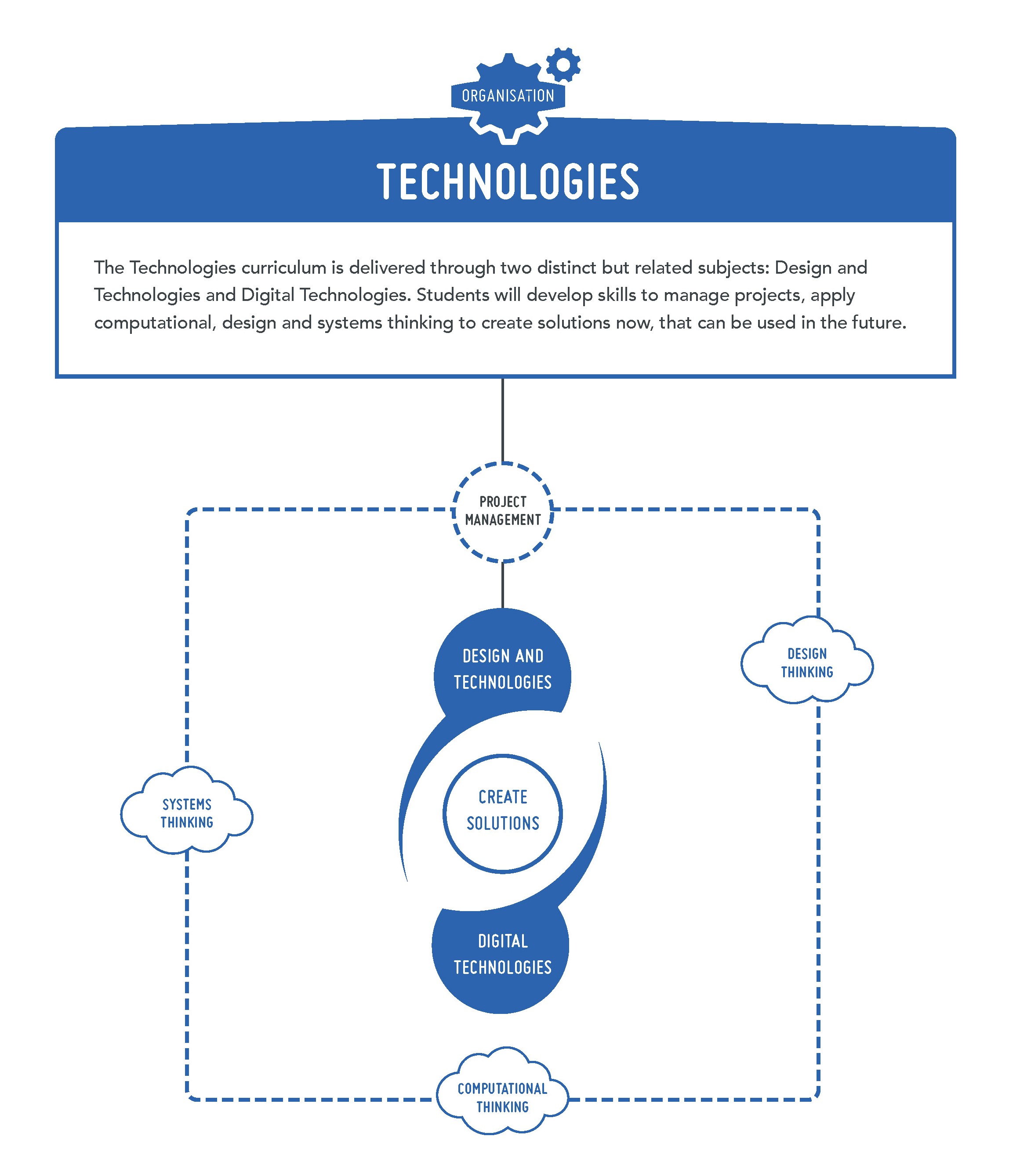
In Design and Technologies students learn about technologies in society through different technologies contexts (Engineering principles and systems; Food and fibre production; Food specialisations; and Materials and technologies specialisations) as they create designed solutions.
In Digital Technologies students are provided with practical opportunities to use design thinking and to be innovative developers of digital solutions and knowledge. Digital Technologies has a specific curriculum that includes the practical application of the ICT general capability.
Knowledge, understanding and skills in each subject are presented through two related strands:
- Knowledge and understanding
- Processes and production skills
Teachers select technologies-specific content from the Knowledge and understanding strand and students apply skills from the Processes and production skills to that content.The year level syllabuses for each of these subjects describe the distinct knowledge, understanding and skills of each subject and, where appropriate, highlight their similarities and complementary learning. This approach enables students to develop a comprehensive understanding of traditional, contemporary and emerging technologies. It also provides the flexibility, especially in the primary years of schooling, for developing integrated teaching programs that focus on both Technologies subjects and concepts and skills in other learning areas.
The common 'Creating Solutions' links the two subjects and provides an opportunity to reinforce the following processes and productions skills:
- Investigating and defining
- Designing
- Producing and implementing
- Evaluating
- Collaborating and managing
The Digital Technologies content includes an additional organiser, Digital implementation, to ensure the digital-specific language of computational and systems thinking is reflected in the Processes and production skills.
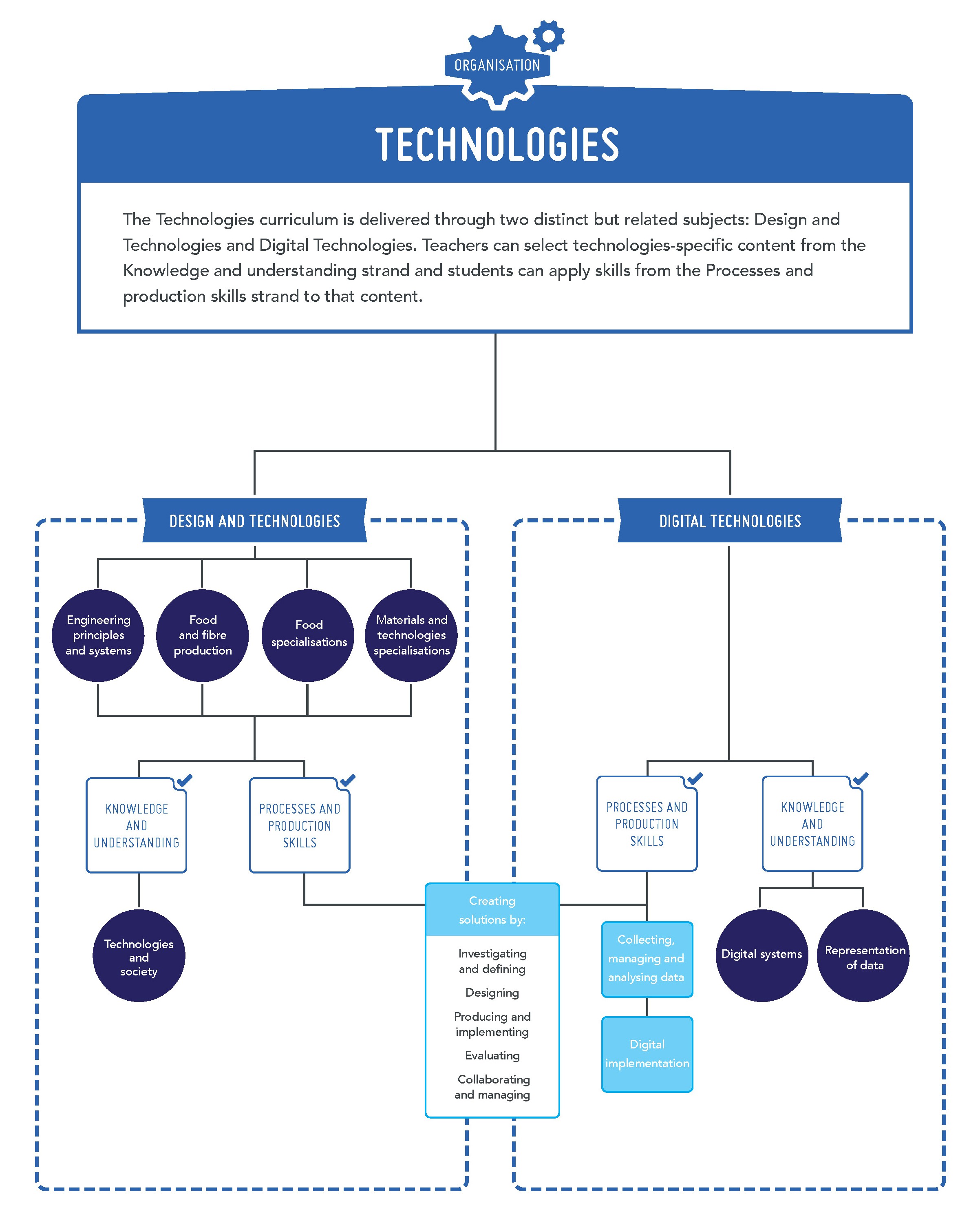
Ways of teaching
The 'ways of teaching' aim to support teachers with planning curriculum delivery across the years of school, with the teaching in each year extending learning in previous years.
The 'ways of teaching' complement the principles of teaching and learning in the Western Australian Curriculum and Assessment Outline (http://k10outline.scsa.wa.edu.au/). The principles assist whole-school planning and individual classroom practice.
The teaching of Technologies requires learning experiences which allow students to:
- develop systems, design and computational thinking
- create digital solutions
- create product, service and environment designed solutions.
In Design and Technologies students learn about technologies and societies through different technologies contexts. In each year students will be given opportunities to create designed solutions in at least one of the technologies contexts below:
- Engineering principles and systems – in this context the focus is on how forces can be used to create light, sound, heat, movement, control or support in systems
- Food and fibre production – in this context the focus is on the process of producing food or fibre as natural materials for the design and development of a range of products. Fibre includes materials from forestry (Food and fibre production includes Food specialisations from Pre-primary to Year 4)
- Food specialisations – in this context the focus is on the application of nutrition principles and knowledge about the characteristics and properties of food to food selection, preparation; and contemporary technology-related food issues
- Materials and technologies specialisations – in this context the focus is on a broad range of traditional, contemporary and emerging materials and specialist areas that typically involve extensive use of technologies. This includes materials such as, textiles, metal, wood and plastics.
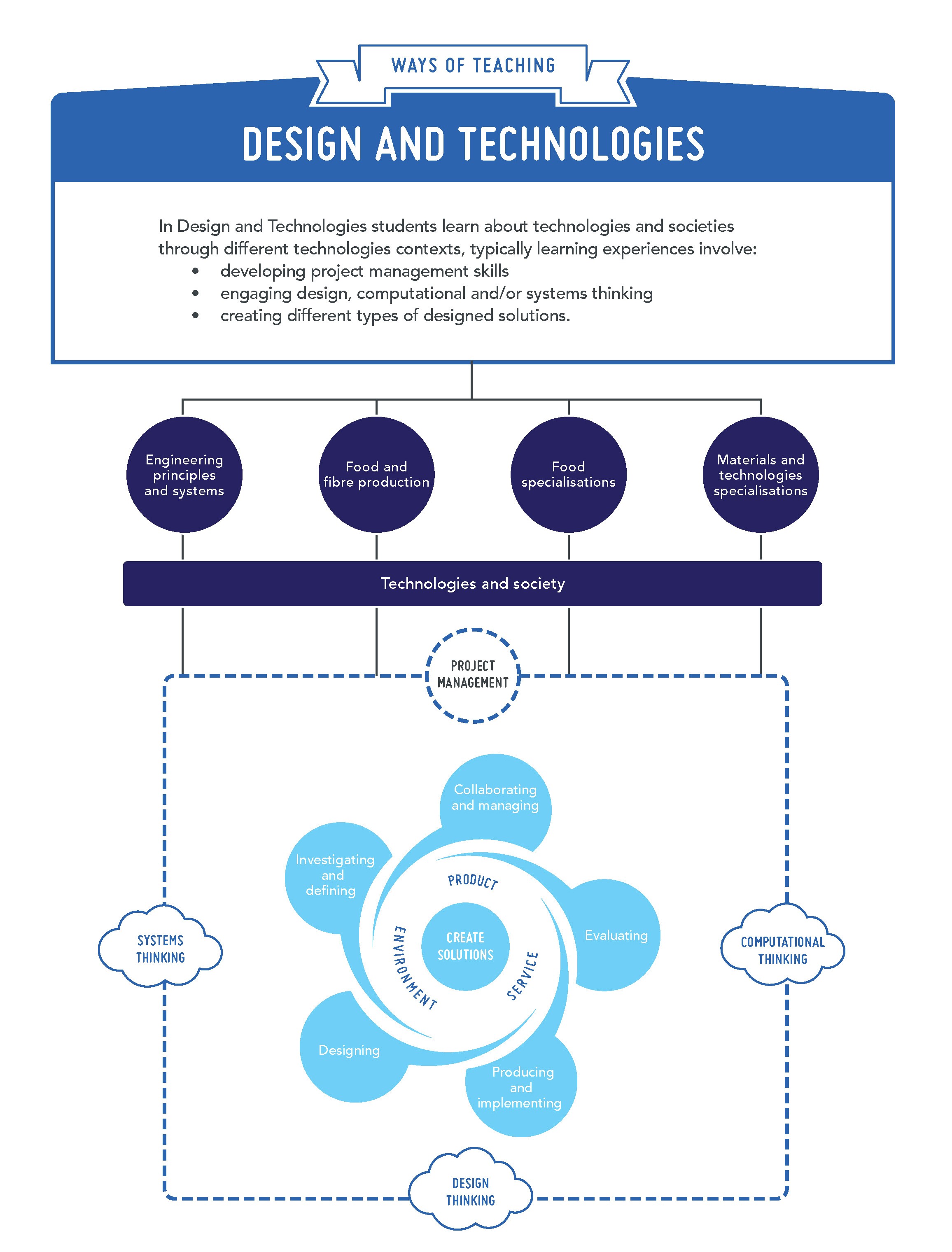
In Digital Technologies, students develop an understanding of the characteristics of data, digital systems, audiences, procedures and computational thinking. They apply this when they investigate, communicate and create digital solutions.
The ICT capability involves students in learning to make the most of the technologies available to them, adapting to new ways of doing things as technologies evolve, and limiting the risks to themselves and others in a digital environment.
The difference between the Digital Technologies curriculum and the ICT general capability is that the capability helps students to become effective users of digital technologies while the Digital Technologies curriculum helps students to become confident developers of digital solutions.
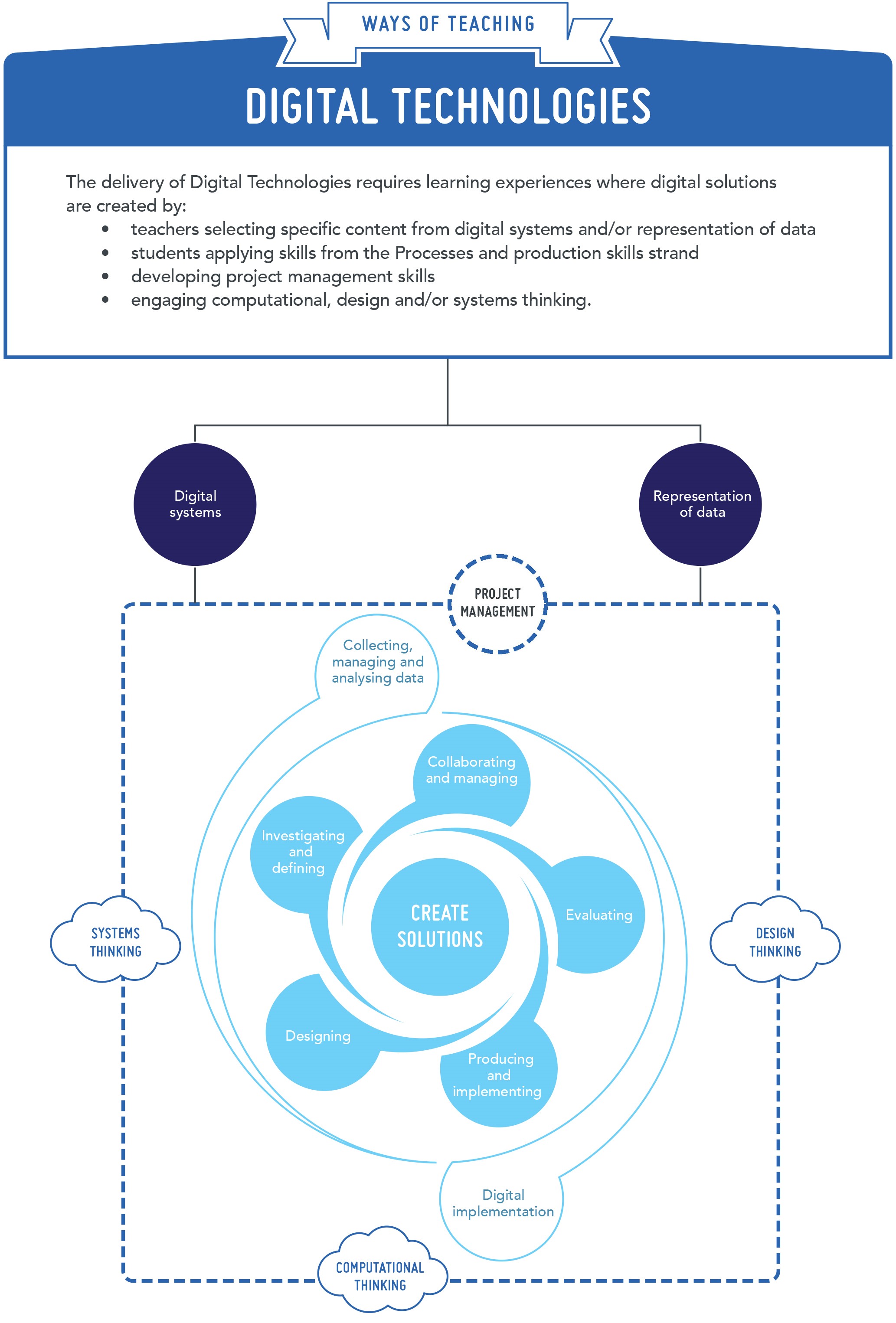
In the primary years, the Technologies subjects are often interrelated and connected through other learning areas. When programming, teachers can use the Technologies learning area as a basis for the practical application and development of concepts from other learning areas.
In the secondary years, Technologies is typically a specialist area, with both subjects and each of the contexts taught by specialist teachers.
When developing teaching and learning programs:
- the teacher identifies the prior knowledge of students to establish a starting point for the learning
- the teacher defines the subject and context for the learning experience with reference to the content descriptions (for example, Design and Technologies – Food and fibre production)
- the teacher and students identify the problem, situation or need that requires a solution, considering resources available.
Teacher Support Materials
To assist teachers and schools during the transition to full implementation of the Western Australian Curriculum: Technologies in 2018, the following information will be available in the Western Australian Curriculum and Assessment Outline progressively in 2016:
- a learning area video exploring the 'ways of teaching'
- sample assessment activities illustrating the assessment strategies from the 'ways of assessing' (http://k10outline.scsa.wa.edu.au/home/p-10-curriculum/curriculum-browser/technologies/technologies-overview/ways-of-assessing) for Pre-primary to Year 10
- Judging Standards Materials to support teacher judgements for reporting including annotated student work samples for both Design and Technologies, across the four contexts, and Digital Technologies, and assessment pointers for Pre-primary to Year 10.
The Authority is currently developing the Achievement Standards, and the Assessment Pointers, for Design and Technologies and Digital Technologies.
Humanities and Social Sciences Heads of Learning Areas Seminar
Contact
Mandy Hudson (08) 9273 6755
mandy.hudson@scsa.wa.edu.au
Following requests from teachers, the Authority is presenting a seminar on the implementation of the Years 7-10 Humanities and Social Sciences curriculum for Heads of Learning Area.
The implementation seminar will be held at the School Curriculum and Standards Authority, 303 Sevenoaks Street Cannington. Heads of Learning Area are encouraged to register.
The seminar dates are as follows:
Wednesday, 1 June 2016 9.00 – 11.00 am
Thursday, 2 June 2016 1.00 – 3.00 pm
Tuesday, 7 June 2016 9.00 – 11.00 am
Thursday, 9 June 2016 1.00 – 3.00 pm
Registration will be online through the Authority website from Week 2 Term 2 at: http://www.scsa.wa.edu.au/events/hass-seminars.
Clarification of teaching the content in the Western Australian Curriculum: The Arts (Music)
Contact
Jane Alderson (08) 9273 6756
jane.alderson@scsa.wa.edu.au
The Western Australian Curriculum: The Arts (Music) has been designed to incorporate flexibility of delivery for schools with varying time allocations, and to enable teaching in different contexts. Suggested contexts could include Western Art Music, Contemporary Music, Jazz, Music Theatre, Music for Film and Television, World and Indigenous Musics or Music Technology.
The Year Level Description in Years 7 to 10 states, 'Music learning is aurally based and is integrated across all aspects of the written component of the subject through a selected context/s. The performance component reinforces and extends music learning, and can be delivered in a different context to the written component. The elements of music are to be integrated across all areas of music learning as appropriate to context'.
In the Music Literacy strand, not all content may be relevant to the selected context.
The content has been scoped and sequenced from Pre-primary to Year 10 to provide an indication of an appropriate standard for each year level, and allow for sufficient preparation for students who may choose to study the ATAR or General Music courses in Years 11 and 12.
Links to Scootle resources in the Western Australian Curriculum for Phases 2 and 3 Learning Areas
Contact
Mandy Hudson (08) 9273 6755
mandy.hudson@scsa.wa.edu.au
The Western Australian Curriculum for Humanities and Social Sciences, Health and Physical Education, Technologies and The Arts have been adapted from the Australian Curriculum to meet the needs of Western Australian teachers and students by developing year-level syllabuses from Pre-primary to Year 10. Achievement standards will be based on the Western Australian curriculum. The curriculum is located in the Western Australian Curriculum and Assessment Outline on the Authority’s website and is the mandated curriculum for Western Australian schools.
The syllabuses for these learning areas contain links to the resources available through Scootle, using the ACARA code where applicable. These links will direct teachers to a selection of resources relevant to specific content. Teachers in Western Australia should disregard reference to the Australian Curriculum content descriptions and elaborations, as the Western Australian curriculum has embedded relevant elaborations in the content descriptions for clarity or exemplification across the four Learning Areas in Phases 2 and 3.
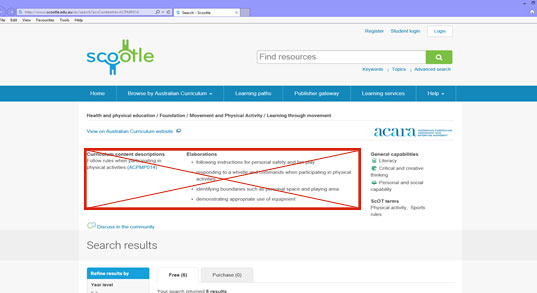
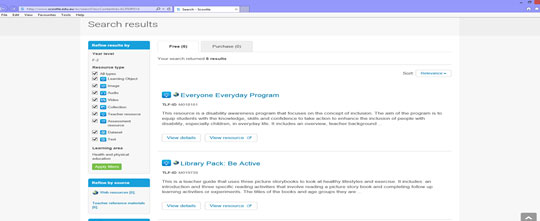
Student work samples for Pre-primary to Year 10 for Technologies
Contact
Mandy Hudson (08) 9273 6755
mandy.hudson@scsa.wa.edu.au
The School Curriculum and Standards Authority is currently developing the Judging Standards resources for teachers in the Technologies learning area, for both Design and Technologies and Digital Technologies.
The Authority collected student work samples during 2015 for Pre-primary to Year 10, and is keen to continue collecting additional work samples across the Technologies in Terms 2 and 3 2016. Student work samples are required for the following subjects/contexts:
* Digital Technologies Years 5,6, 9 and 10
* Design and Technologies - Engineering principles and systems Years 8, 9 and 10
* Design and Technologies - Food and fibre Years 7, 8, 9 and 10
* Design and Technologies - Food specialisations Years 7 and 10
* Design and Technologies - Materials and technologies specialisations Years 7, 8 and 10
If you would like to assist, and you are teaching content from the Western Australian Curriculum, please contact mandy.hudson@scsa.wa.edu.au.
The Authority is willing to work with teachers to develop assessment tasks to support the Judging Standards materials.
National Assessment Program in Literacy and Numeracy 2016 - NAPLAN Update 3
Contact
Marilyn McKee (08) 9442 9460
Marilyn.McKee@scsa.wa.edu.au
Registration and Participation Website | The website will re-open in the student participation stage on 26 April and will close on 20 May. From 26 April schools should go to https://pearsononline.com.au/ opens in new window and log on using the same username and password as for the registration stage to carry out the following tasks:
|
Participation Website support | For website support and access inquiries, including username and password information, schools should use the Pearson help desk number 1800 665 627 between 8:00am and 4:00 pm WST. A user manual with detailed instructions on how to use the website for recording student participation can be downloaded by clicking on the link on the first page after login. |
Delivery of test materials | Delivery of test materials to schools is expected between 26 April and 5 May. If materials have not arrived by 5 May schools should call 1800 665 627. On receipt of test materials schools should open boxes and check quantities without opening the tamper-evident packs. Acknowledgement of receipt of materials and requests for any additional materials should be made by 5 May by going to https://pearsononline.com.au/ opens in new window and logging on to the Participation Website. Instructions can be found in the letter with the test materials or in the website user manual. |
Delivery of additional test materials | Additional materials requested through the Participation Website will be posted to arrive by May 5, where possible. Please contact the K-10 Testing Branch on 9442 9461 or |
Delivery of special print materials and alternative test formats | Please note that any specially printed test books (Braille, large print, black and white masters and electronic formats of tests) will be sent separately from the main package and should arrive at the school by 5 May. A set of pre-printed books for these students will be included with the delivery of regular test materials. The regular test books should be returned together with the specially printed books for transcription and marking. Please use the special return envelope provided for alternative format tests, and the original box for return of all Braille materials. Transcription must not be done at the school. |
Secure storage of test materials | Principals should ensure the security and confidentiality of test materials from the time of receipt to the end of the secure period (20 May) as outlined in Section 4.3 Responsibilities of the principal on pages 6 and 7 of the Handbook for principals. |
Preparing test materials for distribution | Principals are reminded that test materials should not be prepared for distribution to classes more than one day before the test and should not be handed to supervising teachers until the morning of the test. Schools must schedule and administer tests as described in section 8.4 of the Handbook for principals. Tests must NOT be conducted before the official test date under any circumstances. |
Exemption protocols | All students should be given the opportunity to participate in all tests; however, students in the following categories only may be considered, with parent/caregiver written consent, for exemption:
Students for whom an exemption application has been submitted and approved are considered as assessed students and are counted in the ‘below minimum standard’ calculations for reporting purposes in national and jurisdictional data. Exempt students:
|
Withdrawal protocols | Parents or caregivers may choose to withdraw their children from the tests. This is a matter for consideration by individual parents in consultation with the principal. Withdrawals are intended to address issues such as religious beliefs and philosophical objections to testing. The process should be initiated by the parent/caregiver. Students for whom a signed withdrawal form has been submitted and approved are not counted as part of the cohort of assessed students. Parents may request that their child's exempt or withdrawn status is changed to participating at any time. Use a blank test book for the student if an overprinted test book has not been supplied for the student. |
Students with temporary injuries | Principals are reminded that they are responsible for submitting applications for the use of a computer for the Writing test for students with a temporary injury. Applications should be made prior to Tuesday 10 May (Writing test day). Forms can be found at the address below and on the Participation website: http://k10outline.scsa.wa.edu.au/home/assessment/testing/naplan/schools/forms |
Test conditions | Schools are reminded that:
http://www.nap.edu.au/information/faqs/faqs.html opens in new window) The following items are NOT permitted in the test area under any circumstances:
|
Test incidents | Any incidents relating to breaches of the security and confidentiality of the test materials or failure to follow the national protocols for test administration should be reported immediately to the K-10 Testing Branch (9442 9460). |
Information | Information about NAPLAN in WA can be accessed on the School Curriculum and Standards Authority website at the address below: A schedule of preparation tasks for NAPLAN 2016 can be found at the web page below and in the Handbook for principals: Further information is available from the NAPLAN website at the address below: |
Enquiries | Please contact the K-10 Testing team if you have any queries.
|
Year 10 Information Handbook 2016 and Year 10 Parent Presentation PowerPoint available online
Contact
Trish Dunnett (08) 9273 6794
patricia.dunnett@scsa.wa.edu.au
The Year 10 Information Handbook 2016 and the Year 10 Parent Presentation are available on the Authority's website via the publications tab at: http://www.scsa.wa.edu.au/.
The Year 10 Parent Presentation PowerPoint has been developed to support schools for their Year 10 parent presentation.
The handbook is essential reading for Year 10s, their families and teachers. Students can save the handbook on electronic devices and type notes into the notes section.
Schools should encourage students to read this information handbook carefully. It contains information for students on a range of important topics:
- how to achieve the Western Australian Certificate of Education (WACE)
- the Western Australian Statement of Student Achievement (WASSA)
- WACE requirements
- WACE courses
- Unit equivalents
- Endorsed programs
- Study options.
The placement of Judging Standards Materials on the Authority website
Contact
Mandy Hudson (08) 9273 6755
Mandy.Hudson@scsa.wa.edu.au
The placement of Judging Standards Materials on the Authority website
The School Curriculum and Standards Authority launched a revised website on Thursday, 21 April 2016.
As part of this revision, the existing Judging Standards materials for English, mathematics, science and history (until December 2016) were moved to the Authority’s extranet. The Judging Standards materials for all learning areas, including those published in 2016 for Humanities and Social Sciences and Health and Physical Education, will be housed in the extranet for privacy of student work samples, especially for those relating to performance.
The extranet is the Authority’s secure area for teachers to access materials and resources to support them in their work. Registration with the TRBWA is required to access the extranet. University staff and final year education students can register for limited access to the extranet with their university email address.
Please note these materials are provided as a teacher resource. They are unavailable to the general public and can only be seen when you are logged in.
If you have an existing login for the Authority’s extranet, you should have received an email with a temporary password to the revised site. If you did not receive an email, please contact: LMShelp@scsa.wa.edu.au.
If you are new to the extranet, you can register on the Login page which is accessible at the top of each page of the Authority website.
P-10 Alternative Curriculum Recognition Process (New Information)
Contact
Juanita Healy (08) 9273 6375
juanita.healy@scsa.wa.edu.au
Vanessa Peters (08) 9273 6779
vanessa.peters@scsa.wa.edu.au
New information in regard to the 2016 alternative curriculum (and/or reporting on student achievement) process has been published in the Western Australian Curriculum and Assessment Outline (the Outline) at: http://k10outline.scsa.wa.edu.au/home/p-10-curriculum/alternative-curriculum-recognition.
In 2016, the School Curriculum and Standards Authority (the Authority) will be accepting alternative curriculum submissions for the following Pre-primary to Year 10 learning areas:
- Humanities and Social Sciences
- Health and Physical Education
- English
- Mathematics
- Science.
Schools who previously received recognition from the Authority for Pre-primary to Year 10 English, Mathematics and Science will be required to demonstrate how they have incorporated the changes made in V8.1 English, Mathematics and Science.
The Authority’s timeline for submissions for Pre-primary to Year 10 Technologies, The Arts and Languages is available within the Outline.
SIRS – Change to URL
Contact
SIRShelp (08) 9273 6719
SIRShelp@scsa.wa.edu.au
Schools are advised that the URL to log onto SIRS has changed. The revised URL is as follows:
https://sirs.scsa.wa.edu.au/
Could you please ensure that staff using SIRS are informed of this change.
